Paul Crook
KETOD: Knowledge-Enriched Task-Oriented Dialogue
May 11, 2022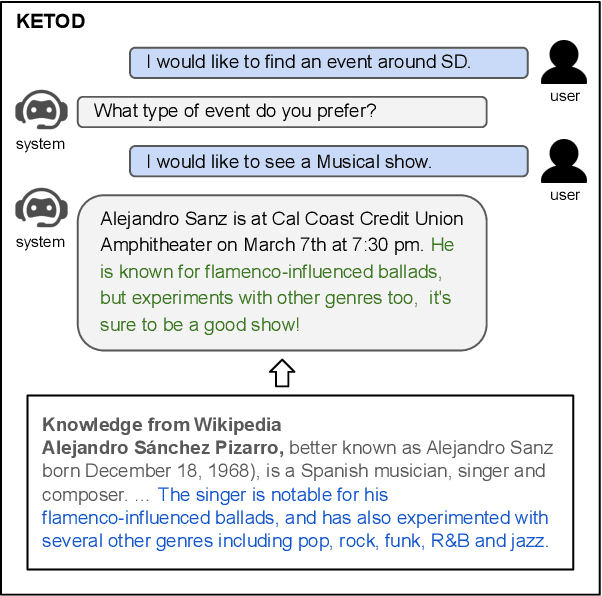
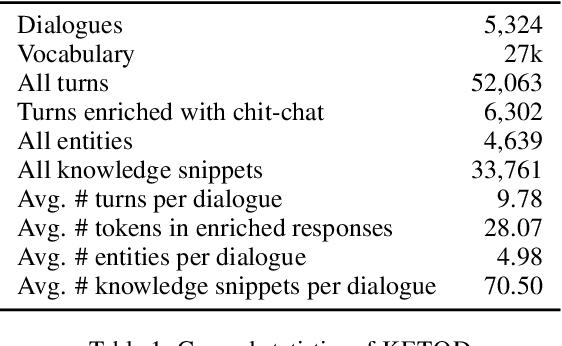


Abstract:Existing studies in dialogue system research mostly treat task-oriented dialogue and chit-chat as separate domains. Towards building a human-like assistant that can converse naturally and seamlessly with users, it is important to build a dialogue system that conducts both types of conversations effectively. In this work, we investigate how task-oriented dialogue and knowledge-grounded chit-chat can be effectively integrated into a single model. To this end, we create a new dataset, KETOD (Knowledge-Enriched Task-Oriented Dialogue), where we naturally enrich task-oriented dialogues with chit-chat based on relevant entity knowledge. We also propose two new models, SimpleToDPlus and Combiner, for the proposed task. Experimental results on both automatic and human evaluations show that the proposed methods can significantly improve the performance in knowledge-enriched response generation while maintaining a competitive task-oriented dialog performance. We believe our new dataset will be a valuable resource for future studies. Our dataset and code are publicly available at \url{https://github.com/facebookresearch/ketod}.
Database Search Results Disambiguation for Task-Oriented Dialog Systems
Dec 15, 2021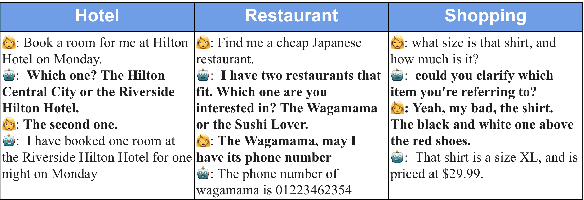

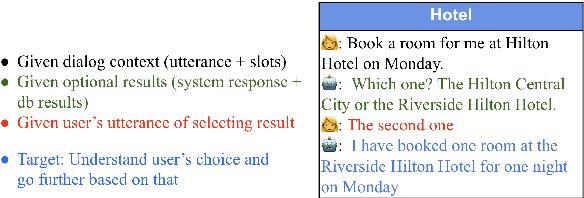

Abstract:As task-oriented dialog systems are becoming increasingly popular in our lives, more realistic tasks have been proposed and explored. However, new practical challenges arise. For instance, current dialog systems cannot effectively handle multiple search results when querying a database, due to the lack of such scenarios in existing public datasets. In this paper, we propose Database Search Result (DSR) Disambiguation, a novel task that focuses on disambiguating database search results, which enhances user experience by allowing them to choose from multiple options instead of just one. To study this task, we augment the popular task-oriented dialog datasets (MultiWOZ and SGD) with turns that resolve ambiguities by (a) synthetically generating turns through a pre-defined grammar, and (b) collecting human paraphrases for a subset. We find that training on our augmented dialog data improves the model's ability to deal with ambiguous scenarios, without sacrificing performance on unmodified turns. Furthermore, pre-fine tuning and multi-task learning help our model to improve performance on DSR-disambiguation even in the absence of in-domain data, suggesting that it can be learned as a universal dialog skill. Our data and code will be made publicly available.
Zero-Shot Dialogue State Tracking via Cross-Task Transfer
Sep 10, 2021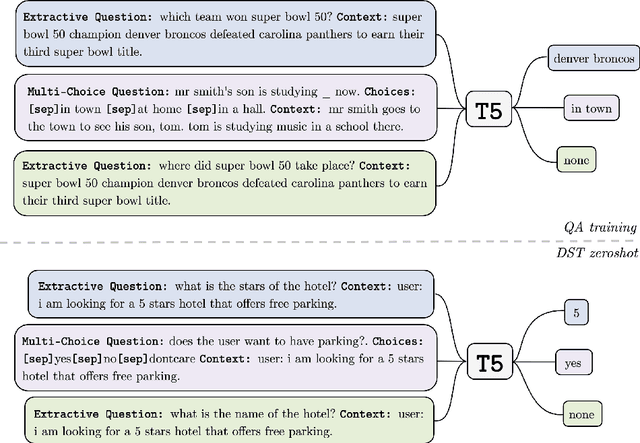
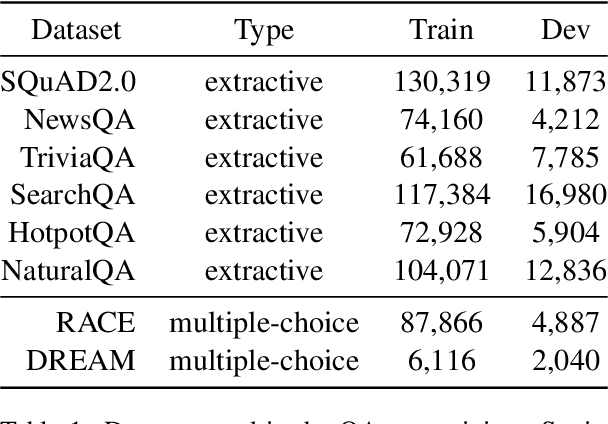
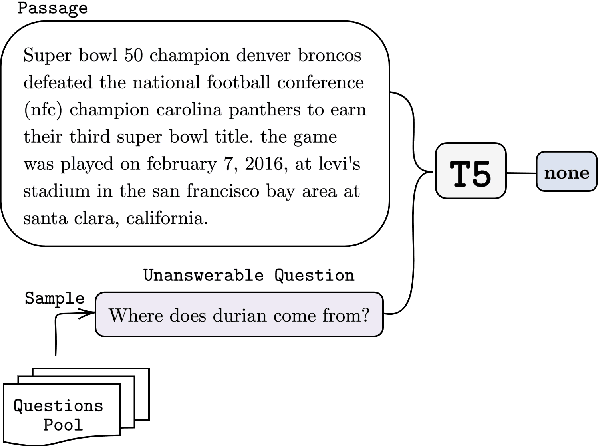

Abstract:Zero-shot transfer learning for dialogue state tracking (DST) enables us to handle a variety of task-oriented dialogue domains without the expense of collecting in-domain data. In this work, we propose to transfer the \textit{cross-task} knowledge from general question answering (QA) corpora for the zero-shot DST task. Specifically, we propose TransferQA, a transferable generative QA model that seamlessly combines extractive QA and multi-choice QA via a text-to-text transformer framework, and tracks both categorical slots and non-categorical slots in DST. In addition, we introduce two effective ways to construct unanswerable questions, namely, negative question sampling and context truncation, which enable our model to handle "none" value slots in the zero-shot DST setting. The extensive experiments show that our approaches substantially improve the existing zero-shot and few-shot results on MultiWoz. Moreover, compared to the fully trained baseline on the Schema-Guided Dialogue dataset, our approach shows better generalization ability in unseen domains.
Leveraging Slot Descriptions for Zero-Shot Cross-Domain Dialogue State Tracking
May 10, 2021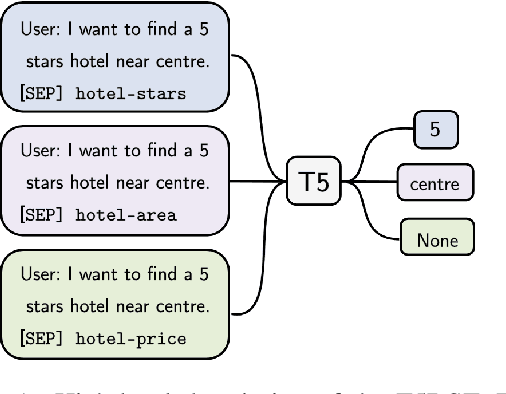
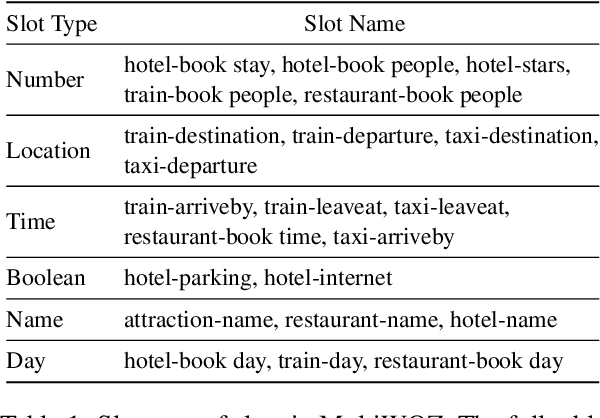
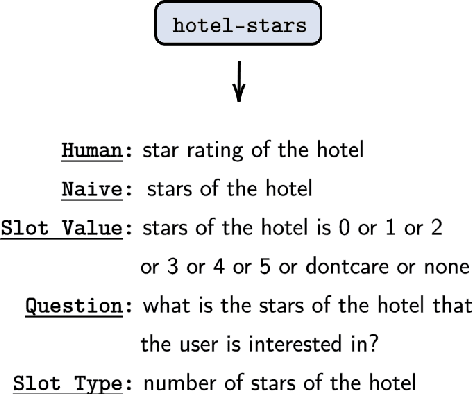
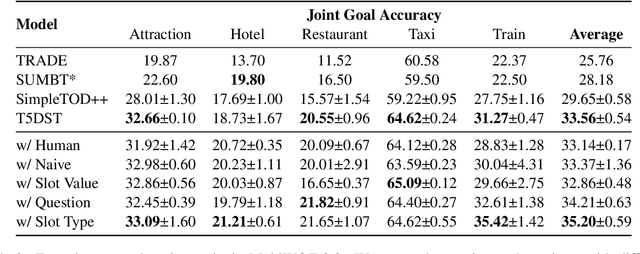
Abstract:Zero-shot cross-domain dialogue state tracking (DST) enables us to handle task-oriented dialogue in unseen domains without the expense of collecting in-domain data. In this paper, we propose a slot description enhanced generative approach for zero-shot cross-domain DST. Specifically, our model first encodes dialogue context and slots with a pre-trained self-attentive encoder, and generates slot values in an auto-regressive manner. In addition, we incorporate Slot Type Informed Descriptions that capture the shared information across slots to facilitate cross-domain knowledge transfer. Experimental results on the MultiWOZ dataset show that our proposed method significantly improves existing state-of-the-art results in the zero-shot cross-domain setting.
Continual Learning in Task-Oriented Dialogue Systems
Dec 31, 2020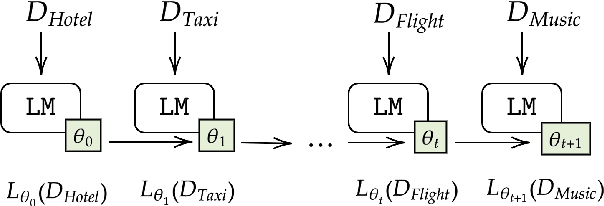
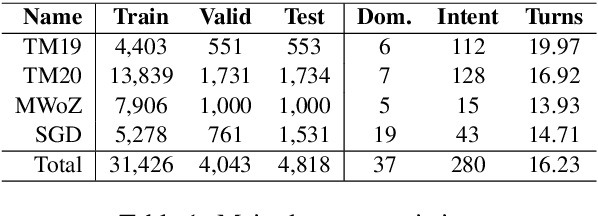
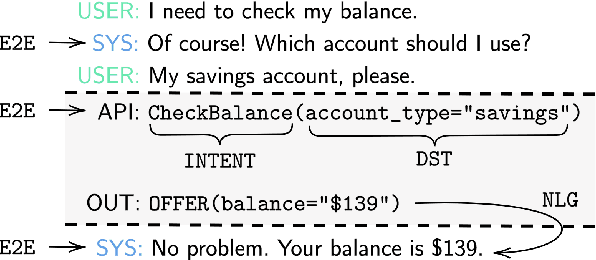
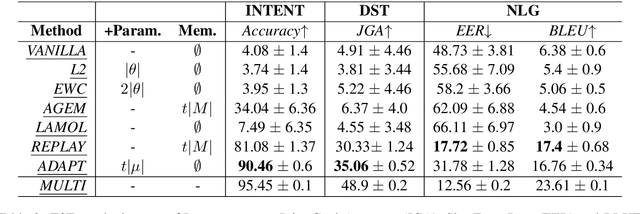
Abstract:Continual learning in task-oriented dialogue systems can allow us to add new domains and functionalities through time without incurring the high cost of a whole system retraining. In this paper, we propose a continual learning benchmark for task-oriented dialogue systems with 37 domains to be learned continuously in four settings, such as intent recognition, state tracking, natural language generation, and end-to-end. Moreover, we implement and compare multiple existing continual learning baselines, and we propose a simple yet effective architectural method based on residual adapters. Our experiments demonstrate that the proposed architectural method and a simple replay-based strategy perform comparably well but they both achieve inferior performance to the multi-task learning baseline, in where all the data are shown at once, showing that continual learning in task-oriented dialogue systems is a challenging task. Furthermore, we reveal several trade-offs between different continual learning methods in term of parameter usage and memory size, which are important in the design of a task-oriented dialogue system. The proposed benchmark is released together with several baselines to promote more research in this direction.
Resource Constrained Dialog Policy Learning via Differentiable Inductive Logic Programming
Nov 10, 2020


Abstract:Motivated by the needs of resource constrained dialog policy learning, we introduce dialog policy via differentiable inductive logic (DILOG). We explore the tasks of one-shot learning and zero-shot domain transfer with DILOG on SimDial and MultiWoZ. Using a single representative dialog from the restaurant domain, we train DILOG on the SimDial dataset and obtain 99+% in-domain test accuracy. We also show that the trained DILOG zero-shot transfers to all other domains with 99+% accuracy, proving the suitability of DILOG to slot-filling dialogs. We further extend our study to the MultiWoZ dataset achieving 90+% inform and success metrics. We also observe that these metrics are not capturing some of the shortcomings of DILOG in terms of false positives, prompting us to measure an auxiliary Action F1 score. We show that DILOG is 100x more data efficient than state-of-the-art neural approaches on MultiWoZ while achieving similar performance metrics. We conclude with a discussion on the strengths and weaknesses of DILOG.
Adding Chit-Chats to Enhance Task-Oriented Dialogues
Oct 24, 2020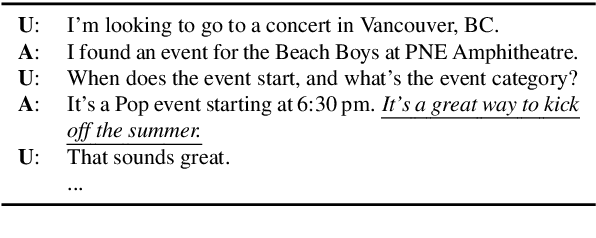

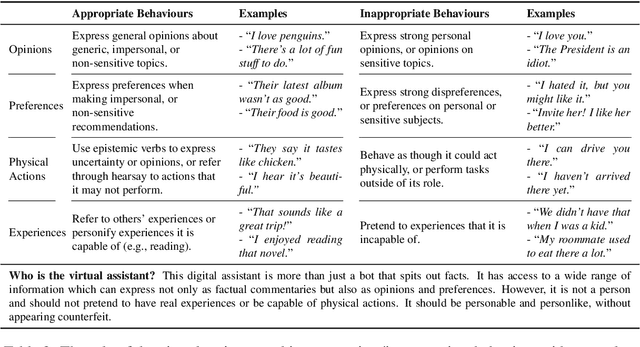
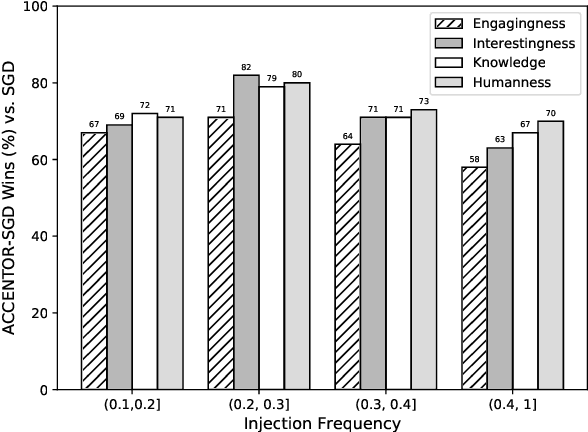
Abstract:The existing dialogue corpora and models are typically designed under two disjoint motives: while task-oriented systems focus on achieving functional goals (e.g., booking hotels), open-domain chatbots aim at making socially engaging conversations. In this work, we propose to integrate both types of systems by Adding Chit-Chats to ENhance Task-ORiented dialogues (ACCENTOR), with the goal of making virtual assistant conversations more engaging and interactive. Specifically, we propose a flexible approach for generating diverse chit-chat responses to augment task-oriented dialogues with minimal annotation effort. We then present our new chit-chat annotations to 23.8K dialogues from the popular task-oriented datasets (Schema-Guided Dialogue and MultiWOZ 2.1) and demonstrate their advantage over the originals via human evaluation. Lastly, we propose three new models for ACCENTOR explicitly trained to predict user goals and to generate contextually relevant chit-chat responses. Automatic and human evaluations show that, compared with the state-of-the-art task-oriented baseline, our models can code-switch between task and chit-chat to be more engaging, interesting, knowledgeable, and humanlike, while maintaining competitive task performance.
Information Seeking in the Spirit of Learning: a Dataset for Conversational Curiosity
May 01, 2020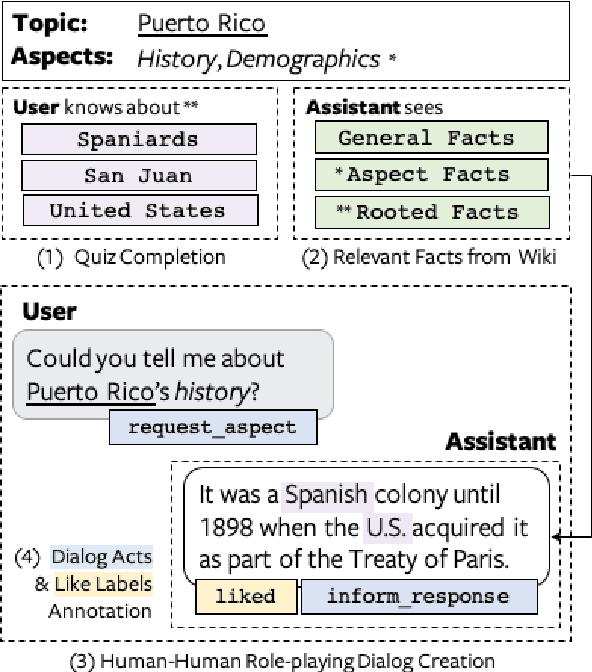
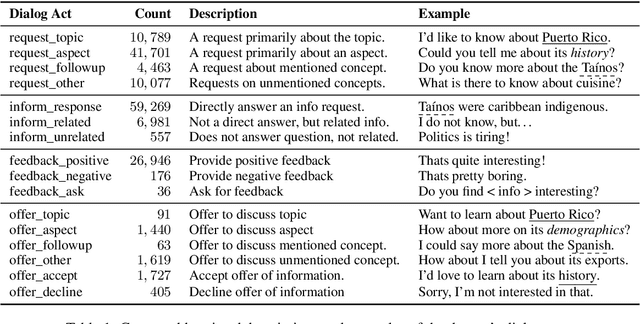
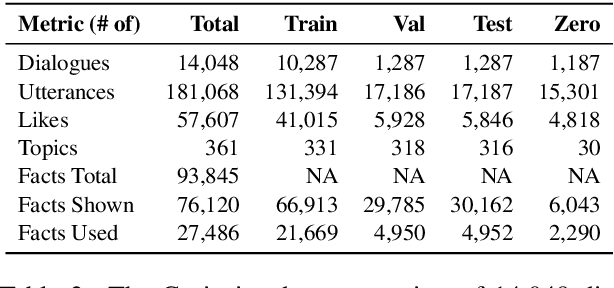
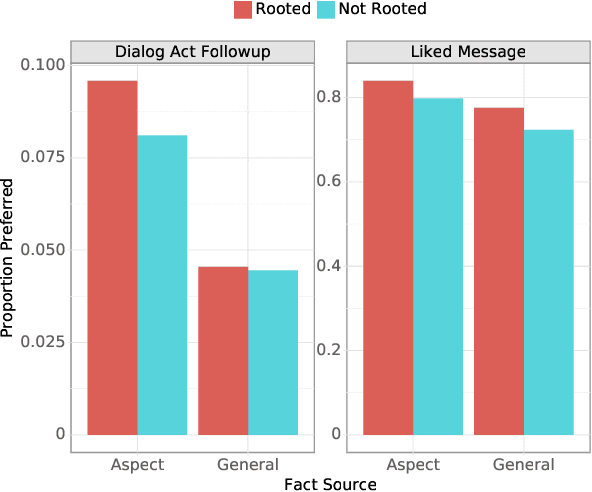
Abstract:Open-ended human learning and information-seeking are increasingly mediated by technologies like digital assistants. However, such systems often fail to account for the user's pre-existing knowledge, which is a powerful way to increase engagement and to improve retention. Assuming a correlation between engagement and user responses such as "liking" messages or asking followup questions, we design a Wizard of Oz dialog task that tests the hypothesis that engagement increases when users are presented with facts that relate to their existing knowledge. Through crowd-sourcing of this experimental task we collected and now open-source 14K dialogs (181K utterances) where users and assistants converse about various aspects related to geographic entities. This dataset is annotated with pre-existing user knowledge, message-level dialog acts, message grounding to Wikipedia, user reactions to messages, and per-dialog ratings. Our analysis shows that responses which incorporate a user's prior knowledge do increase engagement. We incorporate this knowledge into a state-of-the-art multi-task model that reproduces human assistant policies, improving over content selection baselines by 13 points.
Recommendation as a Communication Game: Self-Supervised Bot-Play for Goal-oriented Dialogue
Sep 09, 2019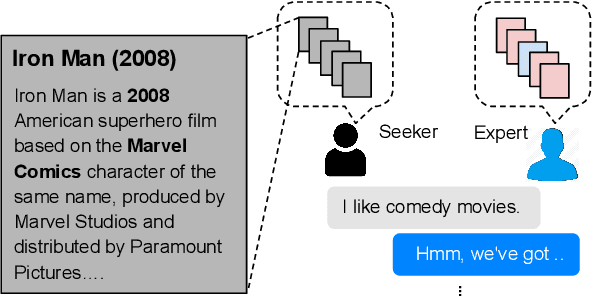
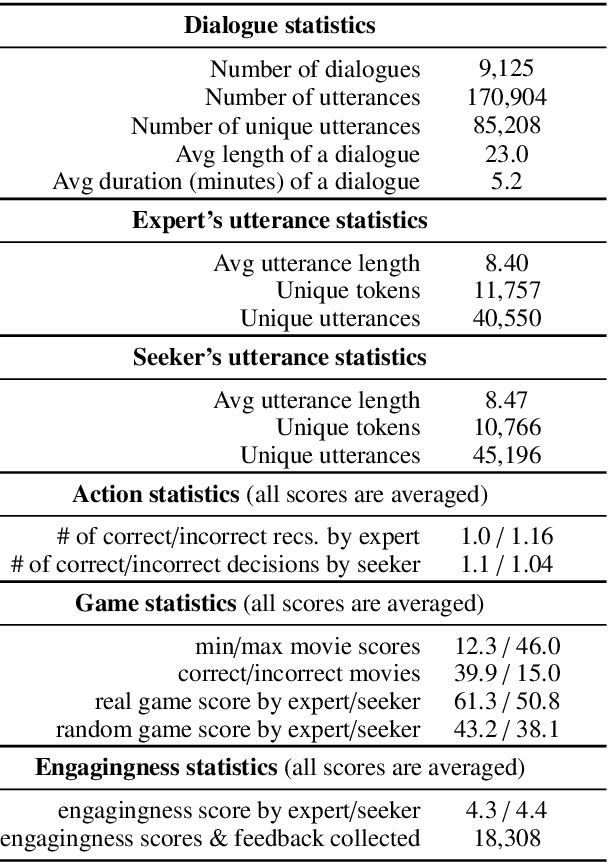
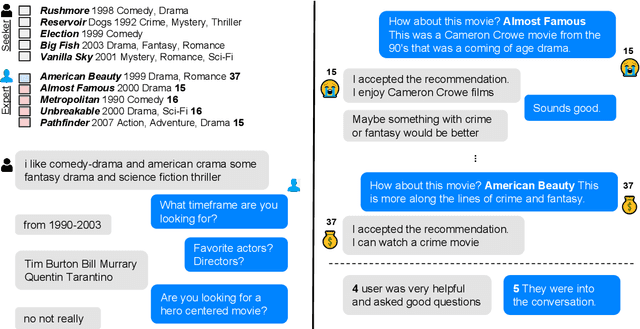
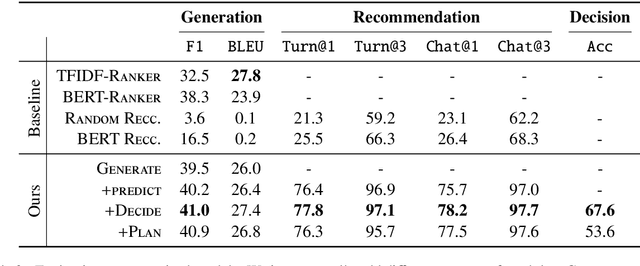
Abstract:Traditional recommendation systems produce static rather than interactive recommendations invariant to a user's specific requests, clarifications, or current mood, and can suffer from the cold-start problem if their tastes are unknown. These issues can be alleviated by treating recommendation as an interactive dialogue task instead, where an expert recommender can sequentially ask about someone's preferences, react to their requests, and recommend more appropriate items. In this work, we collect a goal-driven recommendation dialogue dataset (GoRecDial), which consists of 9,125 dialogue games and 81,260 conversation turns between pairs of human workers recommending movies to each other. The task is specifically designed as a cooperative game between two players working towards a quantifiable common goal. We leverage the dataset to develop an end-to-end dialogue system that can simultaneously converse and recommend. Models are first trained to imitate the behavior of human players without considering the task goal itself (supervised training). We then finetune our models on simulated bot-bot conversations between two paired pre-trained models (bot-play), in order to achieve the dialogue goal. Our experiments show that models finetuned with bot-play learn improved dialogue strategies, reach the dialogue goal more often when paired with a human, and are rated as more consistent by humans compared to models trained without bot-play. The dataset and code are publicly available through the ParlAI framework.
End-to-End Joint Learning of Natural Language Understanding and Dialogue Manager
Jan 04, 2017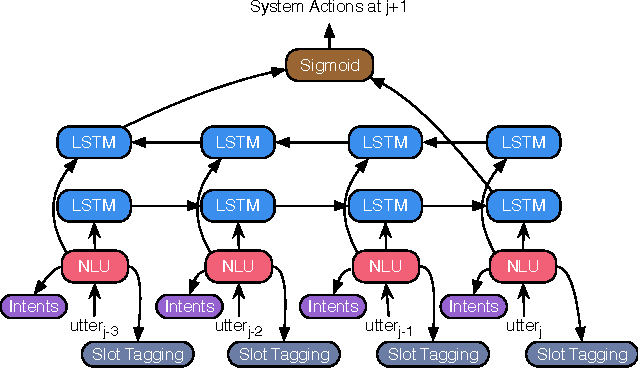

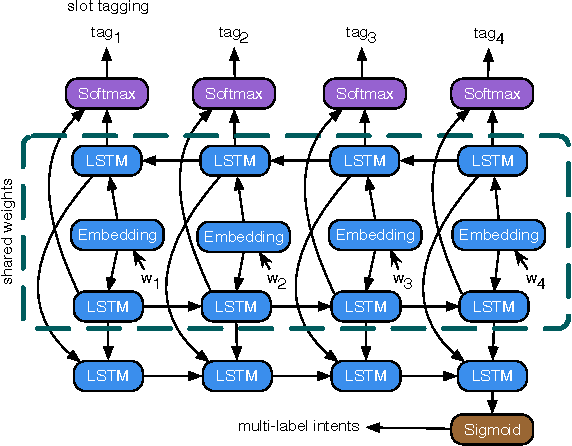
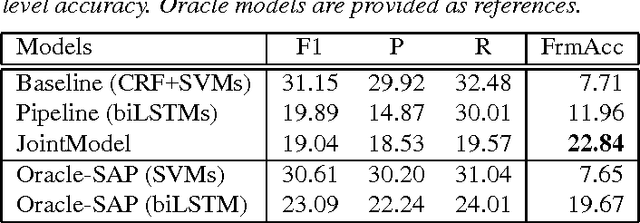
Abstract:Natural language understanding and dialogue policy learning are both essential in conversational systems that predict the next system actions in response to a current user utterance. Conventional approaches aggregate separate models of natural language understanding (NLU) and system action prediction (SAP) as a pipeline that is sensitive to noisy outputs of error-prone NLU. To address the issues, we propose an end-to-end deep recurrent neural network with limited contextual dialogue memory by jointly training NLU and SAP on DSTC4 multi-domain human-human dialogues. Experiments show that our proposed model significantly outperforms the state-of-the-art pipeline models for both NLU and SAP, which indicates that our joint model is capable of mitigating the affects of noisy NLU outputs, and NLU model can be refined by error flows backpropagating from the extra supervised signals of system actions.
 Add to Chrome
Add to Chrome Add to Firefox
Add to Firefox Add to Edge
Add to Edge